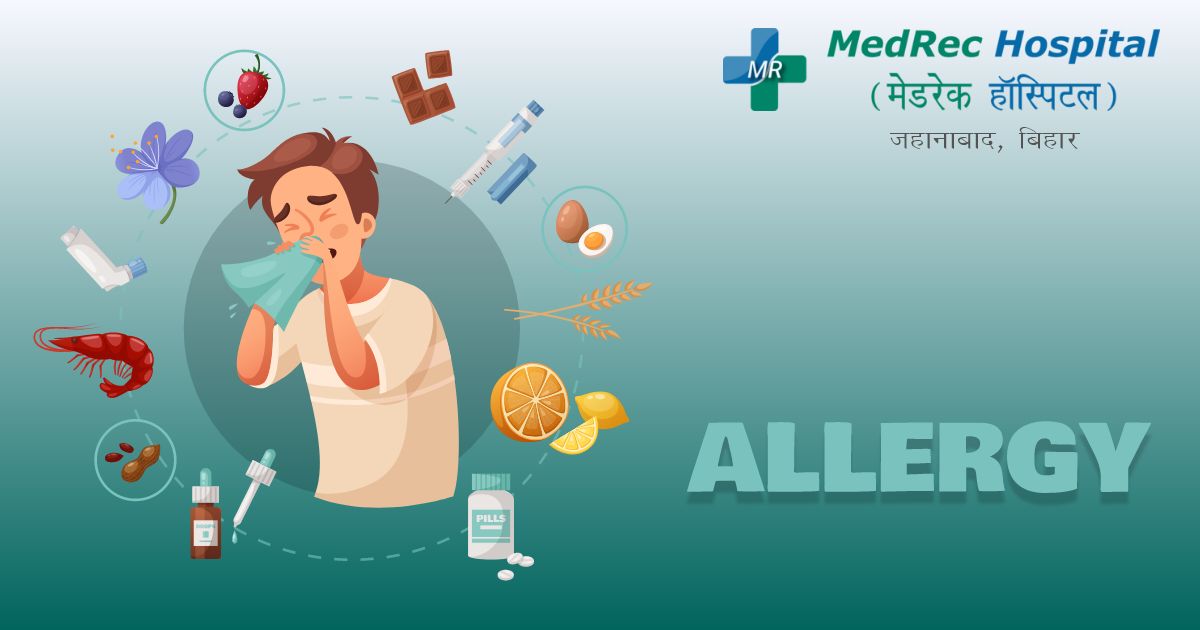
Allergies : Causes, Symptoms And Treatment
774
When your immune system reacts to a food or substance such as pollen or bee venom an allergy may develop.
Antibodies are chemicals made by your immune system. Your immune system produces antibodies that label a specific allergen as hazardous even when it is not when you have allergies. Your skin, sinuses, airways, or digestive tract may become inflamed as a result of your immune system's reaction when you come into contact with the allergen.
Individual differences in allergy intensity mean that it can range from a simple annoyance to a potentially fatal emergency called anaphylaxis. Although most allergies cannot be cured, there are therapies that can help you feel better.
Causes
When your immune system misidentifies a typically safe chemical as a potentially harmful intruder, an allergy develops. Following that, the immune system creates antibodies that continue to be on the lookout for that specific allergen.
These antibodies may cause a range of immune system chemicals, including histamine, to be released when you are exposed to the allergen once more, leading to allergy symptoms.
Common causes of allergies include:
- Animal dander, dust mites, pollen, and mould are examples of airborne allergens.
- Several foods, including milk, wheat, soy, fish, shellfish, eggs, nuts, peanuts, and others
- Stings from insects, such as bees or wasps
- Medications, especially antibiotics that include penicillin
- Touching latex or other materials that induce adverse skin responses
How to check if you have Allergies?
If you face any of the following symptoms, please seek medical advice immediately:
- Coughing, wheezing, or shortness of breath
- A runny nose
- Tightness around your cheekbones, eyes, or forehead
- Diarrhoea
- Feeling or being unwell
- Swollen eyes, lips, mouth, or throat
- Itchy skin or a raised rash (hives)
Make an appointment to visit your doctor if you experience a severe allergic reaction or any of the signs and symptoms of anaphylaxis.
Anaphylaxis evaluation, diagnosis, and long-term care are difficult, therefore you should consult a clinician with experience in allergies and immunology.
Risk Factors
Risk factors that can increase the chance of you developing an allergy are:
- If you possess a family history of allergies or asthma, including hay fever, hives, or eczema
- If you are a minor
- If you suffer from allergies or another medical condition
Symptoms
Depending on the chemical, allergy symptoms might impact your skin, digestive system, sinuses, and nasal passages. Acute to moderate allergic responses are possible. In some extreme circumstances, allergies can result in a potentially fatal reaction known as anaphylaxis.
Hay fever symptoms:
- Sneezing
- The roof of the mouth, the eyes, or the nose may itch.
- Runny, congested nose
- Red, swollen, or watery eyes (conjunctivitis)
Food allergies symptoms:
- In-mouth tingling
- Lips, tongue, face, or throat swelling
- Hives
- Anaphylaxis
An allergy to insect stings has the following symptoms:
- A large swollen region at the sting site
- Body itching or hives everywhere
- Cough, pressure in the chest, wheezing, or breathlessness
- Anaphylaxis
Drug allergies have the following symptoms:
- Hives
- Skin rash
- Facial edoema
- Hives
- Wheezing
- Anaphylaxis
Prevention
Depending on the type of allergy you have, you can prevent allergic responses.
Here are some examples of general measures:
Abstain from recognised triggers. Try to avoid triggers even if you are managing your allergy symptoms.
Keep a journal. Track your activities, what you eat, when symptoms arise, and what appears to assist when attempting to determine what triggers your allergy symptoms.
Put on a bracelet with a medical alert. A medical alert bracelet (or necklace) notifies people if you have experienced a major allergic reaction.
Treatments
- Whenever feasible, attempt to avoid the substance to which you are allergic
- Antihistamines, steroid pills, and steroid creams are examples of medications for moderate allergic responses.
- For severe allergic responses, emergency medications called adrenaline auto-injectors, such as an EpiPen, are available.
- Immunotherapy for desensitisation of severe allergic responses approach entails progressively exposing you to the allergen over time so that your body becomes accustomed to it and does not react as severely (this should only be done by a medical professional)
- A treatment plan for managing your allergies will be provided to you by your specialist or doctor.
Complications of Allergies
Anaphylaxis is a severe response that can be brought on by some allergies, such as food and insect sting allergies. Anaphylaxis is a potentially fatal medical emergency that can send you into shock. Anaphylaxis symptoms and signs include:
- Consciousness loss
- Lower blood pressure
- Severe breathlessness
- Skin rash
- Dizziness
- Feeble pulse
- Nausea and diarrhoea
Asthma. You are more prone to develop asthma, an immune system reaction that affects the airways and breathing, if you have an allergy. Asthma is frequently brought on by exposure to an environmental allergen.
Infections of the lungs or ears, as well as sinusitis. If you have allergies or asthma, you have an increased chance of developing these illnesses.
For further information please access the following resources:
Emergency : +91 89686 77907
Front Desk : +91 98018 79584
Page last reviewed: Mar 3, 2023
Next review due: Mar 3, 2025







.jpg)
.jpg)
.jpg)
.jpg)
.jpg)
.jpg)